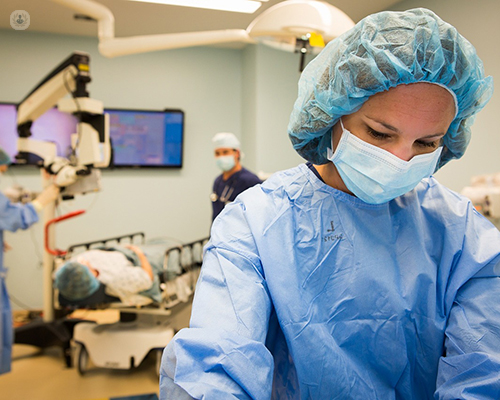Understanding aortic aneurysm: Symptoms, risks, and treatment
Written in association with:In the realm of cardiovascular health, an aortic aneurysm can be a significant concern. In her latest online article, distinguished consultant cardiothoracic surgeon Miss Indu Deglurkar sheds light on the fundamentals of aortic aneurysms (also known as abdominal aortic aneurysms), encompassing their symptoms, severity, and treatment options.

What is an aortic aneurysm?
An aortic aneurysm is an abnormal bulge or swelling in the aorta. This is the body's largest artery, and is responsible for carrying oxygen-rich blood from the heart to the rest of the body. This dilation occurs due to the weakening of the arterial wall, which can lead to a potentially life-threatening situation if left unaddressed.
Symptoms of aortic aneurysm
Aortic aneurysms often develop without exhibiting noticeable symptoms, earning them the moniker of "silent killers." However, as the aneurysm enlarges, certain signs may manifest, signalling the need for medical attention. These symptoms can include:
- Pain: Individuals may experience dull, deep pain in the chest, abdomen, or back, indicating impending rupture.
- Pulsating sensation: A pulsating sensation near the navel area could signify an abdominal aortic aneurysm.
- Shortness of breath: Difficulty breathing, particularly when lying down, could indicate pressure on the lungs or heart due to an enlarging aneurysm.
- Hoarseness or cough: Compression of adjacent structures by the aneurysm might lead to hoarseness or a persistent cough.
Severity of aortic aneurysm
Aortic aneurysms pose a serious threat to health, primarily due to the risk of rupture. Once ruptured, they can lead to severe internal bleeding, shock, and even death. Therefore, timely detection and intervention are crucial to mitigate these risks and prevent adverse outcomes.
Treatment options
Treatment strategies for aortic aneurysms aim to prevent rupture and its associated complications. Depending on the location, size, and overall health of the patient, healthcare professionals may recommend one of several approaches, including:
- Monitoring: For small, asymptomatic aneurysms, regular monitoring through imaging tests may be sufficient to track their progression.
- Medication: In some cases, medications to control blood pressure and cholesterol levels may be prescribed to reduce the risk of aneurysm growth.
- Surgery: Surgical intervention becomes necessary for larger aneurysms or those at risk of rupture. Common surgical procedures include:
- Aortic root replacement: This involves replacing the aortic root, typically in cases of aortic root aneurysms or dissections.
- Ascending aorta and arch replacement: For aneurysms involving the ascending aorta and arch, surgical repair may entail replacing these segments with prosthetic grafts.
Endovascular repair
In recent years, minimally invasive techniques such as endovascular repair have gained prominence in treating certain types of aortic aneurysms. This approach involves the insertion of a stent graft through small incisions in the groin, guiding it to the site of the aneurysm to reinforce the weakened artery wall.
Miss Indu Deglurkar is a renowned consultant cardiothoracic surgeon basaed in Cardiff. If you would like to book a consultation with Miss Deglurkar, you can do so today via his Top Doctors profile.


